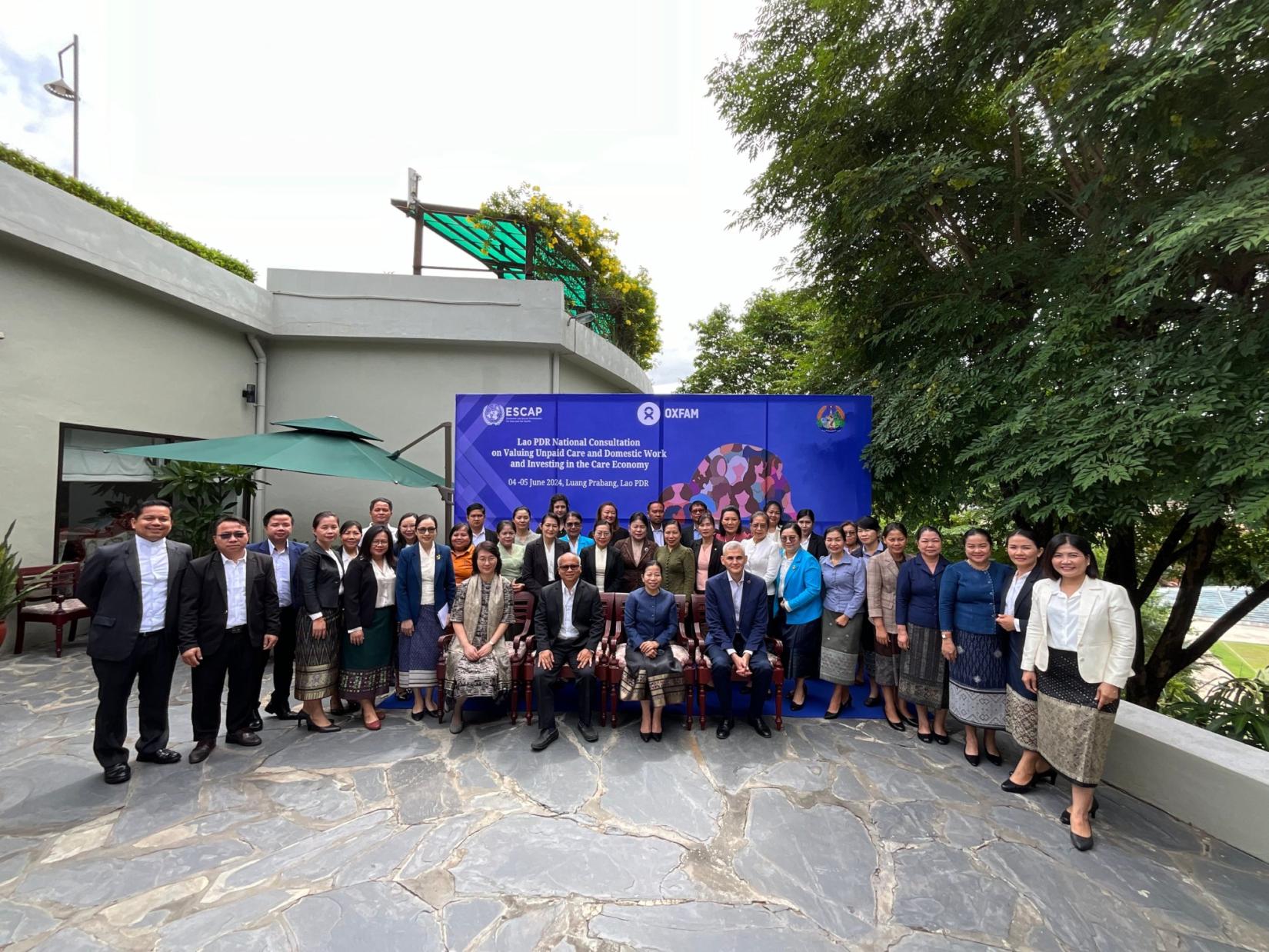Opening Remarks at Lao PDR national consultation on valuing unpaid care and domestic work and investing in the care economy
Remarks by Bakhodir Burkhanov, UN Resident Coordinator

H.E. Thamma Phetvisay, Vice-President of the Lao Women’s Union,
Ms. Cai Cai, Chief of Gender Equality and Social Inclusion Section, Social Development Division of ESCAP,
Mr. Thasphorn Butsaling, Country Director, Oxfam in Laos,
Distinguished participants, ladies and gentlemen –
I want to begin by expressing my thank to all of you for joining us today for this national consultation on Valuing and Investing in Unpaid Care and Domestic Work and Investing in Care Economy. Your presence signifies your commitment to an issue that is not only central to the well-being of individuals and families in Lao PDR, but also fundamental to achieving gender equality and sustainable development in our region.
I'd like to extend my appreciation to the United Nations Economic and Social Commission for Asia and the Pacific (ESCAP), Lao Women’s Union and Oxfam for organizing this important event.
Today, as we gather to discuss unpaid care and domestic work, we must reflect on the broader context of our collective efforts in pursuit of the Sustainable Development Goals and the 2030 Agenda. At the heart of these goals lies the imperative to leave no one behind, recognizing that our progress as a society should be measured by the well-being of the most vulnerable among us. In this light, the matter of unpaid care and domestic work emerges as pivotal, influencing many aspects of our lives, from the economy to healthcare, and from education to gender equality.
The state of gender equality in the Lao PDR is both a cause for optimism and a reason to accelerate efforts to close persistent gender gaps. In the latest Global Gender Gap report1, Lao PDR ranks third best in the ASEAN region after the Philippines and Singapore. Lao PDR’s highest score was in economic participation and opportunity, where it ranked fifth in the world. In large parts, this can be attributed to the operationalization of national laws on gender equality and women’s empowerment. To address care sector challenges and localize efforts to achieve SDG5 on Gender Equality, the government has implemented key legislations and policies. For example, efforts to improve infrastructure have also improved access to vital resources like water and sanitation and preschools2. These actions underscore the government's commitment to enhancing care-related services and infrastructure, reflecting gender-responsive policy measures.
Yet, gender gaps persist. Women in Lao PDR perform on average five times more unpaid care and domestic work burden than men3. This gender disparity restricts women's and girls' access to education and decent work opportunities. Despite having the smallest gender gap in labour force participation among ASEAN countries, caring responsibilities still constitute a significant barrier for women's access to decent work with nearly 30 percent of women citing it as the main barrier to their participation in the labour force4. And in the context of migration, more layers of deprivation emerge, often giving rise to health, psychological and safety risks for migrant care workers.
Investing in care-related social protection contributes to the resilience and empowerment of care workers. It is therefore encouraging that Lao PDR has committed to gradually achieving universal social protection, as seen in the National Social Protection Strategy from 2020. The Strategy needs concerted efforts towards implementation.
I want to acknowledge the important work of the Lao Women’s Union, which has been at the forefront of driving positive change related to care. In collaboration with Oxfam and other partners, LWU played a key role in conducting the Household Care Survey earlier this year, yielding valuable insights into the distribution of unpaid care and domestic work responsibilities, and their societal impact. LWU has also made significant contributions at the regional level through championing the upcoming ASEAN Declaration on Care.
Ladies and gentlemen –
Despite the commendable progress made, there remains a significant implementation gap and inadequate provision of care services, including through targeted investments. Challenges such as the lack of comprehensive and accessible data, especially for rural areas, limited political representation and resource constraints, and deeply ingrained social and cultural norms are significant barriers to solving the problems of unpaid care work.
As we will hear today, we have an unparalleled opportunity to accelerate action on gender equality and across the SDGs through valuing and investing in the care economy. This requires all key stakeholders in Lao PDR to come together, engaging in collaborative efforts across ministries and organizations, to foster a comprehensive understanding of the challenges at hand. By sharing expertise and
insights, diverse actors can cultivate a more equitable and supportive environment for women and girls, ultimately leading to positive effects for the entire society.
For us in the United Nations, it is essential to incorporate gender perspectives in all our activities and inter-agency programs. In mainstreaming gender issues, we are also conducting several joined activities. These include addressing gender-based violence and enhancing employment opportunities for women in rural areas, among others.
On behalf of the UN Country Team, I want to reiterate that all 25 agencies, funds and programmes of the UN System in Lao PDR stand ready to support you all in building stronger, more equitable societies, where no woman or girl is left behind.
Thank you once again for your participation and much needed efforts in valuing and investing in unpaid care and domestic work. I wish you a productive exchange as part of this consultation, yielding positive outcomes for all those involved in care work.
Thank you.



